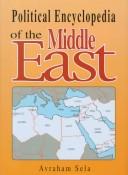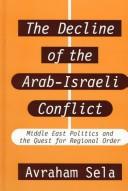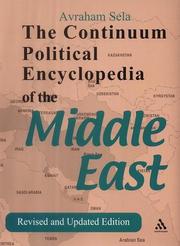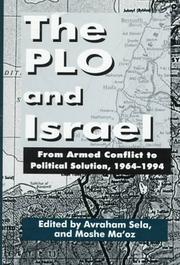| Listing 1 - 10 of 12 | << page >> |
Sort by
|

ISBN: 0826410537 Year: 1999 Publisher: New York Continuum
Abstract | Keywords | Export | Availability | Bookmark
 Loading...
Loading...Choose an application
- Reference Manager
- EndNote
- RefWorks (Direct export to RefWorks)
Politics --- Middle East --- Moyen-Orient --- Politics and government --- Encyclopedias --- History --- Politique et gouvernement --- Encyclopédies --- Histoire --- Encyclopédies --- Encyclopedias. --- 20th century

ISBN: 0585090858 9780585090856 9780791435380 0791435385 9780791435373 0791435377 9781438419398 1438419392 0791435377 0791435385 Year: 1998
Abstract | Keywords | Export | Availability | Bookmark
 Loading...
Loading...Choose an application
- Reference Manager
- EndNote
- RefWorks (Direct export to RefWorks)
This historical study of international Middle East politics in regional perspective presents a comprehensive analysis of the interplay between inter-Arab politics and the conflict with Israel--the two key issues which have shaped the Middle East contemporary history (and made it simultaneously tumultuous and a focus of international affairs).The Decline of the Arab-Israeli Conflict addresses the changing political behavior of the regional Arab system in the Palestine conflict, from total enmity to negotiated peace with Israel. This change is explained as a reflection of state formation process and constant thrust of ruling elites to disengage from compelling supra-state commitments stemming from Pan-Arab nationalist ideology and Islamic political culture.The book scrutinizes the role of Arab summit conferences which, since 1964, became the main collective Arab institution for decision making on common core issues--foremost of which was the conflict with Israel. The summits' main role was to legitimize incremental departure from the overburdening Palestine conflict whose powerful collective symbolism threatened states' autonomy. Summits' consensus sanctioned shifts from hitherto established collective Arab norms toward Israel as well as on inter-Arab relations, in accordance with core actors' interests. The summits offer a view to the Arab regional system's evolution as a negotiated inter-state order based on mutual recognition of sovereign states as opposed to compulsive collectivism in the name of Pan-Arabism. They were, in fact, a manipulation of the regional Arab system by primary participants' coalitions through employment of financial, ideological, and political trade-offs to resolve inter-Arab differences and reach a consensus on redefined collective goals.
Arab-Israeli conflict. --- Arab countries --- Politics and government --- Arab-Israeli Conflict --- History --- Arab-israeli conflict --- Israel --- Political science

ISBN: 0826414133 Year: 2002 Publisher: New York : Continuum,
Abstract | Keywords | Export | Availability | Bookmark
 Loading...
Loading...Choose an application
- Reference Manager
- EndNote
- RefWorks (Direct export to RefWorks)
Political leadership --- Leadership politique --- Biography --- Biographie --- Middle East --- Moyen-Orient --- Politics and government --- Encyclopedias. --- History --- Politique et gouvernement --- Encyclopédies --- Histoire

ISBN: 0231116756 Year: 2000 Publisher: New York Chichester Columbia University Press
Abstract | Keywords | Export | Availability | Bookmark
 Loading...
Loading...Choose an application
- Reference Manager
- EndNote
- RefWorks (Direct export to RefWorks)
Book
ISBN: 9780253023414 0253023416 9780253022424 Year: 2016 Publisher: Bloomington, Indiana ; Indianapolis, [Indiana] : Indiana University Press,
Abstract | Keywords | Export | Availability | Bookmark
 Loading...
Loading...Choose an application
- Reference Manager
- EndNote
- RefWorks (Direct export to RefWorks)
The 1948 War is remembered in this special volume, including aspects of Israeli-Jewish memory and historical narratives of 1948 and representations of Israeli-Palestinian memory of that cataclysmic event and its consequences. The contributors map and analyze a range of perspectives of the 1948 War as represented in literature, historical museums, art, visual media, and landscape, as well as in competing official and societal narratives. They are examined especially against the backdrop of the Oslo process, which brought into relief tensions within and between both sides of the national divide concerning identity and legitimacy, justice, and righteousness of "self" and "other."
Collective memory --- Israel-Arab War, 1948-1949 --- Collective remembrance --- Common memory --- Cultural memory --- Emblematic memory --- Historical memory --- National memory --- Public memory --- Social memory --- Memory --- Social psychology --- Group identity --- National characteristics --- Arab-Israel War, 1948-1949 --- Jewish-Arab War, 1948-1949 --- Palestine War, 1948-1949 --- Arab-Israeli conflict --- Television and the war. --- Art and the war. --- Literature and the war. --- Historiography.

ISBN: 9780231140072 Year: 2006 Publisher: New York (N.Y.) Columbia University Press
Abstract | Keywords | Export | Availability | Bookmark
 Loading...
Loading...Choose an application
- Reference Manager
- EndNote
- RefWorks (Direct export to RefWorks)

ISBN: 0231140061 023114007X Year: 2006 Publisher: New York, N.Y. Columbia University Press
Abstract | Keywords | Export | Availability | Bookmark
 Loading...
Loading...Choose an application
- Reference Manager
- EndNote
- RefWorks (Direct export to RefWorks)
Political sociology --- National movements --- anno 1980-1989 --- anno 1990-1999 --- Palestine

ISBN: 0312129068 Year: 1997 Publisher: New York, N.Y. St. Martin's Press
Abstract | Keywords | Export | Availability | Bookmark
 Loading...
Loading...Choose an application
- Reference Manager
- EndNote
- RefWorks (Direct export to RefWorks)
International relations. Foreign policy --- Polemology --- Palestine Liberation Organization --- anno 1960-1969 --- anno 1970-1979 --- anno 1980-1989 --- anno 1990-1999 --- Israel --- Palestine
Book
ISBN: 0333723708 Year: 1997 Publisher: New York Basingstoke ; London St. Martin's Press Macmillan
Abstract | Keywords | Export | Availability | Bookmark
 Loading...
Loading...Choose an application
- Reference Manager
- EndNote
- RefWorks (Direct export to RefWorks)
Book
ISBN: 0190605790 0190203595 0190203587 Year: 2016 Publisher: New York, NY : Oxford University Press,
Abstract | Keywords | Export | Availability | Bookmark
 Loading...
Loading...Choose an application
- Reference Manager
- EndNote
- RefWorks (Direct export to RefWorks)
Through a diverse array of case studies from countries around the world, Popular Contention, Regime, and Transition places the Arab Spring uprisings in comparative perspective, demonstrating the similarities and parallels between contentious events in democratic and authoritarian-like regimes. By analyzing factors such as the set of initial conditions involved in the protest, prospects of contention, and forms of protest, the volume generates powerful insights into the impetus, dynamics, and consequences of contention in all contexts.
Democratization --- Protest movements --- Arab countries --- Economic conditions --- Politics and government.
| Listing 1 - 10 of 12 | << page >> |
Sort by
|

 Search
Search Feedback
Feedback About UniCat
About UniCat  Help
Help News
News